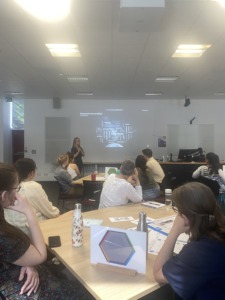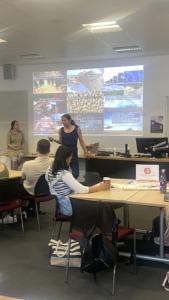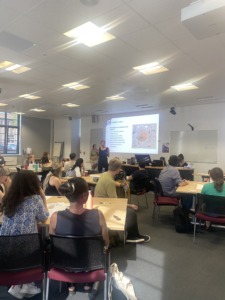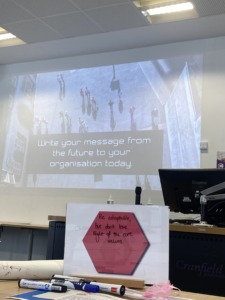Innovation at Play: Empowering change-makers in the food sector (Sustainability Perspective)
11/07/2023

In early June, The Sustainable Business Group delivered the first half of a dynamic two-part workshop for the FoodBioSystems DTP (Doctoral Training Partnership) that combined a simulation game centred around systems thinking with applied innovation sessions run by The Bettany Centre for Entrepreneurship for the second half of the day. The workshop aimed to empower participants to understand their potential impact on shaping the future. Through the “Exploring Sustainable Futures” game, participants immersed themselves in different scenarios by embodying characters from various organisations within society, which provoked new perspectives. By following up with innovation exercises, participants applied these new perspectives to their own research and explored their potential impact. This blog dives deeper into this unique learning experience.
Exploring Sustainable Futures: A Game for Change
Kickstarting the workshop was the simulation game “Exploring Sustainable Futures.” Situated in the food sector (a context explicitly developed for this event) the game provided participants with a dynamic and immersive experience, enabling them to explore the potential impact of their actions on the future. By engaging in systems thinking, participants gained a deeper understanding of the complex interdependencies within the food sector and how innovation can drive transformative change. The game acted as a catalyst for critical thinking, collaboration, and creative problem-solving. The game concept was initially devised in 2018. Since then, the Sustainable Business Group teaming up with Gemma Adams developed a more immersive experience utilising videos and automated scoring. The game uses scenarios to support strategic decision-making in four different pathways towards a sustainable future in 2050. Players representing established businesses interact with players representing entrepreneurs, policymakers, civil society organisations and ‘the public voice’ as they all react to changes in the economy, technology, and society along these pathways.

Morning Session: The Game Unleashed
The workshop began with the simulation led by Gemma Adams. Participants enthusiastically engaged with the game, navigating through various scenarios set within the food sector, travelling through 2030, 2040 and ultimately glimpsing 2050. As they made decisions and faced the consequences, they witnessed the ripple effects of their actions within the simulated food system, responding to real-world problems such as the rise of AI (Artificial Intelligence) technology affecting the ongoing issue of animal extinction, and the evolving landscape of democratic governance. This hands-on experience allowed them to explore the potential impacts of different approaches and strategies, enhancing their understanding of the complex dynamics at play. To enhance the game’s relevance, profiles were created for each role within the food sector. These profiles allowed participants to embody specific organisations, such as a big business like Starbucks, individuals such as influencers or public figures, alongside SMEs like in our game ‘SunFoods’, a food wholesaler. By assuming these roles, participants gained valuable insights into the challenges and opportunities faced by different stakeholders within the food system. This customised approach fostered empathy and a deeper connection to the subject.

Afternoon Workshops: From Game to Research Impact
Building upon the insights gained from playing the game, the afternoon workshops focused on applying the lessons learnt to participants’ research projects. The first workshop led by Dr Orsolya Ihasz, “Exploring what role your research could play in shaping the Future of food systems,” encouraged participants to consider the broader implications of their work. They explored innovative approaches that could contribute to sustainable food systems with an entrepreneurial perspective, incorporating aspects of efficiency, environmental stewardship, and social impact.

The second workshop, led by Professor Stephanie Hussels, “How can you exploit your research and create an impact,” empowered participants to translate their research findings into practical applications and create real-world change by clearly articulating the research purpose, its uniqueness and future value (social and economic relevance) Through interactive exercises and discussions, participants discovered strategies for effectively communicating their research, collaborating with stakeholders, and leveraging opportunities for impact. The workshop aimed to equip participants with the tools and skills necessary to drive meaningful change in their respective fields and maximise the impact of their research.

In summary, the ‘innovation at play’ workshop, made possible by the Food Biosystems Doctoral Training Partnership, highlighted the transformative power of combining simulation games and innovation workshops. By immersing themselves in the simulation game, participants gained a deeper understanding of the complex dynamics of the food system and the potential impact of their actions. The workshops that followed then enabled them to apply their newfound knowledge to their research, unlocking opportunities for innovation and impact. Reflecting on this workshop, we celebrate the immense potential of play, collaboration, and interdisciplinary learning to empower change-makers and shape a sustainable future for our food systems. The learning experience can be applied to driving innovation in specific areas.
Categories & Tags:
Leave a comment on this post:
You might also like…
From classroom to cockpit: What’s next after Cranfield
The Air Transport Management MSc isn’t just about learning theory — it’s about preparing for a career in the aviation industry. Adit shares his dream job, insights from classmates, and advice for prospective students. ...
Setting up a shared group folder in a reference manager
Many of our students are now busy working on their group projects. One easy way to share references amongst a group is to set up group folders in a reference manager like Mendeley or Zotero. ...
Company codes – CUSIP, SEDOL, ISIN…. What do they mean and how can you use them in our Library resources?
As you use our many finance resources, you will probably notice unique company identifiers which may be codes or symbols. It is worth spending some time getting to know what these are and which resources ...
Supporting careers in defence through specialist education
As a materials engineer by background, I have always been drawn to fields where technical expertise directly shapes real‑world outcomes. Few sectors exemplify this better than defence. Engineering careers in defence sit at the ...
What being a woman in STEM means to me
STEM is both a way of thinking and a practical toolkit. It sharpens reasoning and equips us to turn ideas into solutions with measurable impact. For me, STEM has never been only about acquiring ...
A woman’s experience in environmental science within defence
When I stepped into the gates of the Defence Academy it was the 30th September 2019. I did not know at the time that this would be the beginning of a long journey as ...






